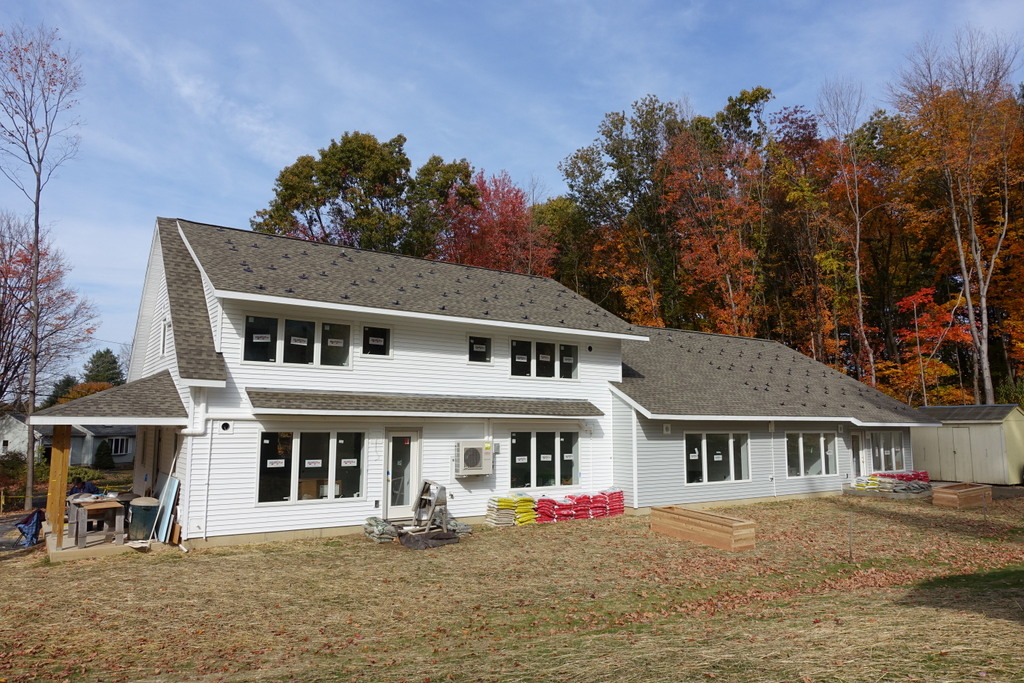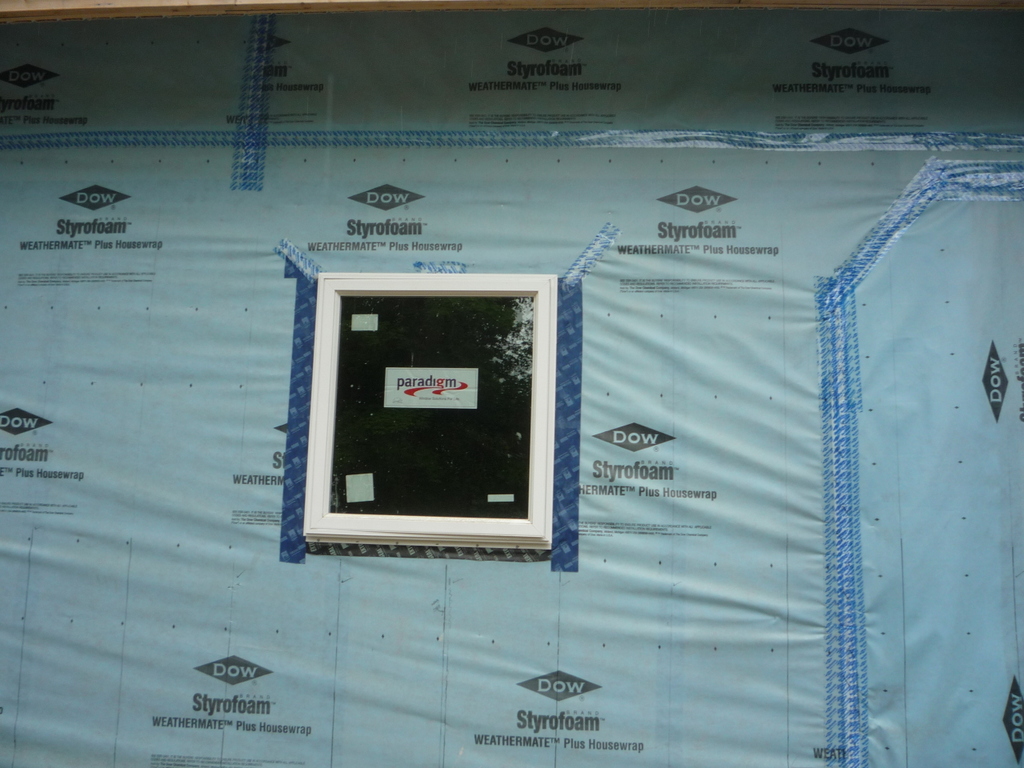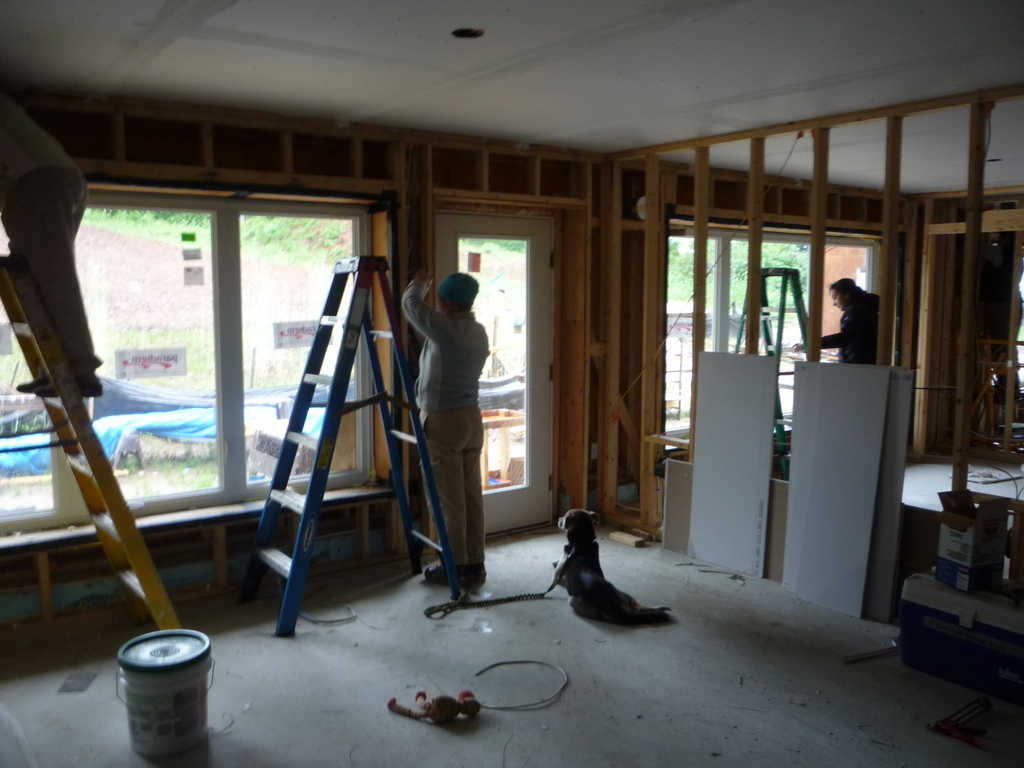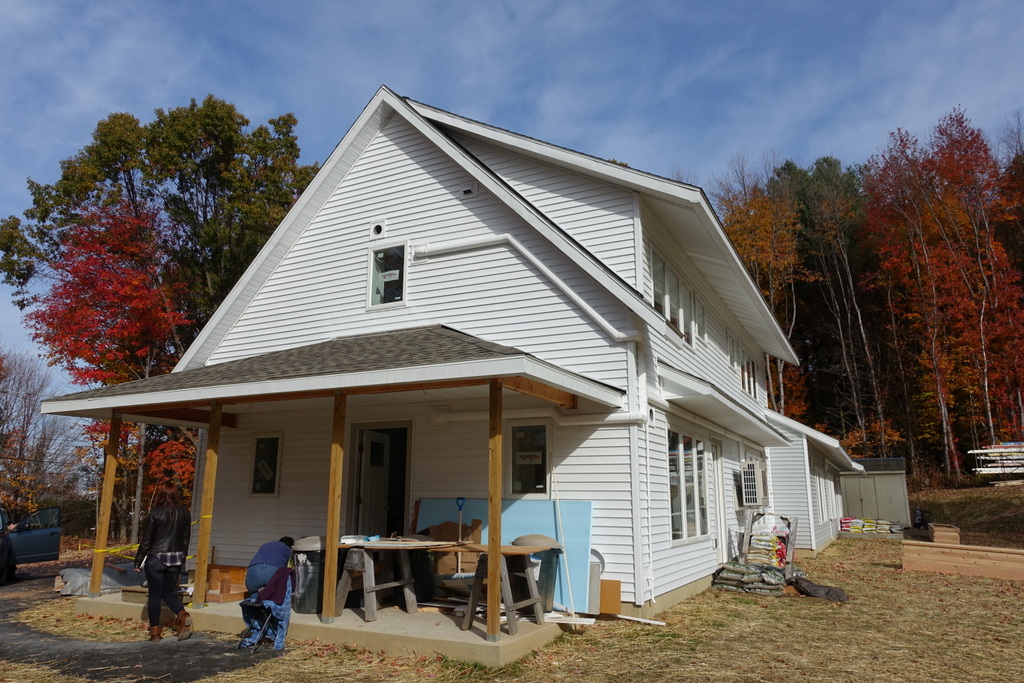Project Subtitle:
Project Description:
Pioneer Valley Habitat for Humanity: "Not only is this build our first Easthampton home, but it is also our first ever Women Build home and our first zero net energy potential house! That's a lot of firsts!" This is a fitting project to be the MJ Adams Legacy Build, in honor of the chapter's first director.
This project aimed to raise the bar in a lot of areas where PV Habitat has been gaining ground in the past decade. Energy efficiency and waste reduction were getting more and more successful, and we thought a bold goal would be a great way to stretch capabilities.
The cottage-style two-story home is the west side of a zero-lot-line project, where each family independently owns their land and home even though they share a wall, which helps reduce envelope exposure. A 4-bedroom, 2-bath home, it will be occupied by a single mother with three children. Due to a generous donation from PV Squared of a huge array--over 7kW--the home has the potential to reach net zero depending on the family's use patterns.
Building Type Summary:
Address:
Elevation:
Lat. / Long.:
Location Type:
Köppen Climate Type:
Climate Region:
Solar Insolation:
Annual HDD :
Annual CDD:
HDD Base Temp:
CDD Base Temp:
Occupancy Type and Details:
Owner-occupied. One adult, three children ages ~4-15
Conditioned Floor Area:
Conditioned Building Volume:
Semiconditioned Floor Area:
Multiple buildings?:
Total floor area of project (all buildings):
Historic?:
Completion date:
Site description:
Previously undeveloped lot along a through street. Neighbors range from small suburban lots to working farms.
Materials:
Minimal foam, only for penetration sealing and under slab insulation. Majority of insulation is cellulose.
Energy Highlights:
Basic net-zero-capable approach, investing in the envelope and minimizing the mechanicals and energy use.
LCA Description:
No.
HERS Index:
Annual renewable energy generated:
Electric Utility Company:
Gas Utility Company:
Datasets and Utility Bills sources and reliability:
Utility meter (extremely reliable) and Omnisense circuit monitoring (highly reliable)
Energy Storage type:
None.
Subslab assembly:
4" XPS (donated by Dow)
Slab edge assembly:
2" XPS between slab and stem wall
Foundation wall assembly:
slab on grade
Above grade wall assembly:
double-stud dense packed cellulose, 11.5" frame to frame
Flat attic assembly:
small portion of flat ceiling (1.5 story construction) with 24" loose fill cellulose
Cathedral ceiling assembly:
2/3 of ceiling sloped with dense-packed cellulose in truss depth, average 27" (model assumed R value 79 with thermal bridging of trusses, and at thinnest location for worst-case scenario, though could be up to 102.6 nominal)
Door Area:
Space heating - Manufacturer & Model:
Space cooling - Manufacturer & Model:
Domestic hot water - Manufacturer & Model:
Domestic hot water - capacity:
Domestic hot water - efficiency:
Ventilation - Manufacturer & Model:
Process:
All-volunteer design team, including 3 architects (one retired), construction managers, and input from Pioneer Valley Habitat for Humanity Building Committee
Design for Adaptability:
Floor level is minimally raised from grade, allowing easy construction of ramps for visitability or low-mobility access for the first floor. Also grab bars in showers.
Other Software tools:
HERS draft rating provided during design phase as backup
Energy Modeling Software:
Marc Rosenbaum's Excel-based Net Zero Energy model
Outcome of project goals:
Most of this high-performance building proved possible to build by a volunteer workforce. It should be noted that some volunteers were extremely skilled, including a local high-performance contractor who donated a day of her crew to install all the windows in both homes.
Air sealing sequence turned out to be difficult for the many supervisors involved in the volunteer model. Building has tightened since the ACH reported here, but it is not likely quite to our air sealing goals.
Building was designed for simpler mechanicals, but it proved impossible to convince installers of likely comfort. It is still early in the super-insulation movement and a lot of expectations will shift slowly.
Discrepancies:
We look forward to the data we will be gathering from these homes, indoor and in-wall temperatures and RH, and energy usage.
Finances Description:
Due in large part to donated labor and materials, these homes are extremely affordable, per the mission of Habitat for Humanity.
Cost below is estimated, and includes one home.
Total Cost of Project:
Construction hard cost:
Gross Cost of Renewable Energy System:
Federal incentives:
None.
State incentives:
MA DOER Pathways to Zero Net Energy Grant $12,000 per unit
Utility incentives:
MassSave New Construction Program $4,000 per unit
Other incentives:
Pioneer Valley Habitat for Humanity raises funds from a variety of sources for construction including the Federal Home Loan Bank of Boston, the Bike & Build Foundation, Easthampton Savings Bank, the Amelia Peabody Foundation, Pioneer Valley Photovoltaics, Lowes and many individual donors.
Pioneer Valley Photovoltaics donated the full cost of the materials and installation of the solar panels and will receive any SRECS.
Advice:
Get all constituents on board prior to construction to finalize decisions, as changes are very costly.
Special architectural measures:
Passive solar orientation of openings and tuned windows. Overhangs sized for seasonal change. Roofs sloped for optimal PV performance.
Energy Strategies:
Basic net-zero-capable approach, investing in the envelope and minimizing the mechanicals and energy use.
Energy Use and Production Documentation:
Subslab R-value:
Slab edge R-value:
Above grade wall R-value:
Flat attic R-value:
Cathedral ceiling R-value:
Average window U-factor:
Solar Heat Gain Coefficient:
Visible Light Transmittance:
Door U-Factor:
Cost per square foot of Conditioned Space:
Air Changes per hour, ACH50:
Project Photos:





Number of Bathrooms:
Scope Description:
All new construction, all single-family residential.
Site conditions:
Renewable Energy Sources:
Other Purchased Fuels Description:
No.
Summary of enclosure strategy/description:
Double-stud, dense-packed cellulose, with some loose-fill in roof, and some rigid foam under slab. Air sealing primarily at sheathing, with backup at drywall.
Roof Assembly:
all insulation in depth of trusses
Window Description:
Paradigm casements low-e with argon, tuned with high-solar-gain glass on south windows
Door Description:
Therma-Tru Smooth Star S601LE
Number of Bedrooms:
Project Team:
Team Member:
Team Member:
Team Member:
Team Members:
Chuck Witham, Lynne Badgett, Libby McLarty on Build Team
